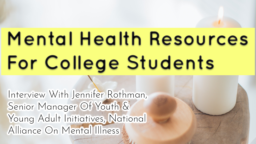TUN sits down with Jennifer Rothman, the senior manager of youth and young adult initiatives at the National Alliance on Mental Illness (NAMI), to discuss the mental health resources available to college students.
TUN: Jennifer, thanks so much for joining us.
ROTHMAN: Of course. Thank you for having me.
Let’s start with on-campus resources. For students struggling with anxiety, depression or other mental health conditions, sometimes seeking professional help can be a little bit intimidating at first. So, for students who aren’t ready to seek professional help, who should they reach out to?
We’re hearing so much about this, and we always have. A lot of times, students are new to campus or leaving home for the first time, so they might be disconnected from their typical support groups.
We really encourage students to get connected as much as they can on campus, maybe via different campus activities or even activities in the community where their campus is. That way, students will have many more options when it comes to finding someone to talk to.
Friends that are acquired through these activities give students a more solid support system. That way, they can talk to them when they’re feeling lonely, stressed, anxious, depressed or overwhelmed.
They can also talk to a resident advisor if they’re in a campus residence hall. They could also maybe talk to the dean of student affairs, a peer support specialist or campus chaplain. It just depends on who they’re comfortable with.
Even on campus, there can be a lot of mental health organizations that are led by students, such as a NAMI on campus or Active Minds. I know the JED Foundation is on a lot of college campuses as well.
So, there should be ways to get connected through those organizations as well if they’re not ready for professional help yet.
If a student is experiencing new feelings of stress, anxiety or other mental health conditions, are there any habits that they can adopt that can change or curb the feelings that they’re experiencing?
Definitely. If these are new symptoms, something that a student has never experienced before, it might be best to just kind of stop and think about what the root cause of these symptoms might be.
Are you feeling lonely because you’re away from home? Are you feeling a lot of stress because your workload at school is too much and you’re falling behind?
Things like creating to-do lists and tackling items one by one can help you with that feeling of being overwhelmed.
Also, go back to what makes you happy. What kind of self-care do you do that can clear your mind of any stressors?
Exercising and making sure that you’re getting enough sleep is important. Sometimes, if you’re spending time studying and it’s getting too late but you’re trying to cram that all in, you forget about how important sleep is.
Asking friends about how they’re managing their stress, listening to relaxing music and just seeking support from your family, friends or peers is important.
Do some research on campus, and see what’s available to you. A lot of times, campus leaders are already aware of some of these issues that students are going to run into, and there are different free classes on campus for yoga, meditation, organization and time management. You can sometimes take advantage of those as well.
Check TUN’s interview with Dr. Danielle Merolla, a clinical psychologist and the associate director of the Center for Prevention and Outreach at Stony Brook University, for advice on how to manage stress in college.
Where should students turn to when they’re ready to seek professional help? Are there any free or affordable resources available to them on their campuses?
Most, but not all, campuses have a mental health center or health clinic. It’s important that students stay informed about this. You have to know what your school offers in terms of mental health care. If you aren’t aware, talk with your resident advisor. You can also talk to academic advisors and faculty members to try and get connected.
Some campuses will offer a certain number of free sessions. After that, they can work with those students on a sliding scale. Again, this isn’t going to be all campuses. Every campus is different. But, just really doing some homework or talking to other students and faculty members can help you get connected with what the school offers.
Now let’s turn to off-campus resources. Are there any off-campus resources, perhaps online, that students can turn to for help?
If students aren’t able to get services on campus or they’re not comfortable using those, they can definitely reach out into their community.
A lot of therapists are offering virtual sessions. You should definitely connect with your family, as well, to see if you might be able to get into your family’s health care.
There are definitely apps out there. I can’t speak for any certain app. But, there are different ones that even are around self-care and meditation for when you’re feeling heavy stress and anxiety.
You can also reach out to your local NAMI organization. We can help get you connected. And, there are other mental health organizations as well that can do a really great job of helping you find the services that are right for you.
You can reach out to your local health and human services office. They can help find you some community services as well and work within whatever your budget might be.
But, one of the biggest things that we want to do is make sure that students don’t stop seeking the help that they need. There’s help out there. And, with that, they have a better chance of recovery.
Thanks, Jennifer, for joining us today.
Of course. Thank you.
This interview has been edited for clarity.



